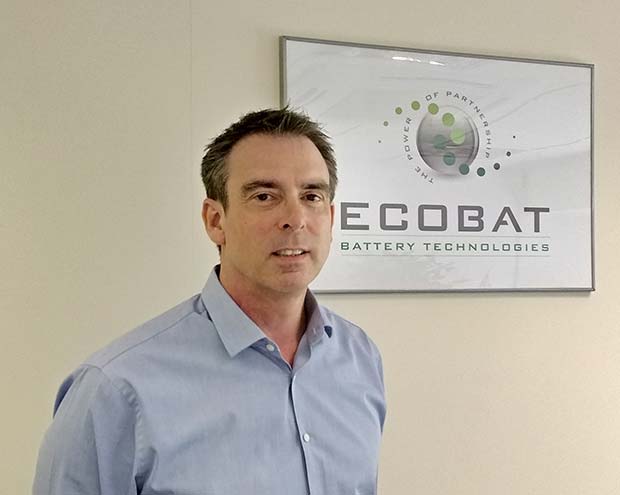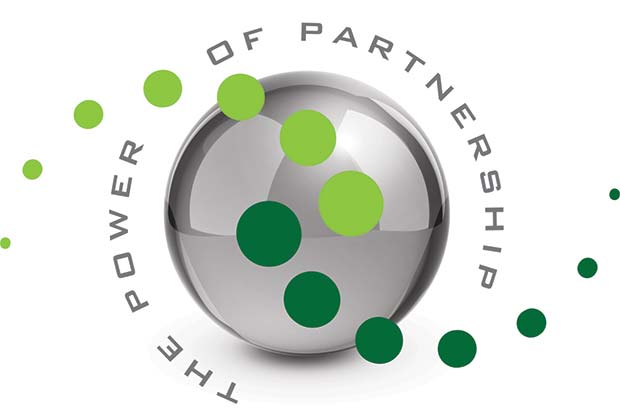The ECOBAT group is the world’s largest lead producer and is currently the only global organisation able to provide a ‘closed loop’ – conducted entirely within the group – recycling option for lead-acid batteries.

Strategic Director at EBT Industrial
In the warehouse and logistics space, the group is represented by its industrial division, ECOBAT Battery Technologies (EBT Industrial), which supplies new replacement batteries from a variety of battery manufacturers to suit its customers’ needs and works with other group member companies who collect, store and dismantle waste lead-acid batteries for recycling.
On the new battery side, as reported in the April 15 issue of Warehouse & Logistics News, EBT Industrial has introduced the iconic Lucas brand into its comprehensive portfolio with the launch of the Lucas range of premium quality motive power forklift batteries to fill the gap in the market for a complete battery on a direct, like-for-like replacement basis, to provide the market with a no hassle, plug and play option. Derek Anderson, Strategic Director at EBT Industrial, spoke to Warehouse & Logistics News.
Warehouse & Logistics News – First of all, Derek, what does your role as Strategic Director at EBT Industrial involve?
In short, to ensure we are able to offer the batteries and charging solutions our customers need for the role in which they are utilising them and that we provide the on-going support they require to optimise their energy efficiencies and the lifespan of the products. In addition, as a nonforklift manufacturer on the FLTA panel, it’s sometimes helpful to bring a wider, more customer-centric focus to the agenda, which again helps ensure we are addressing the needs of our customers.
WLN – How long have you been in your present role? What were you doing before?
I have spent my entire career in the battery sector, originally as an engineer, then as the owner of a specialist battery supplier and since 2014, with EBT Industrial, so I live and breathe batteries. With the knowledge and experience this has given me and the support of my equally capable colleagues, we can appreciate the real-world challenges for battery users, as well as assess the technical capabilities of the products in the market.
WLN – How do you sum up what EBT Industrial does?
Quite simply, we provide solutions for our customers’ energy requirements. This encompasses everything from identifying the most appropriate battery for their equipment, in light of the circumstances in which it is used, through the most efficient charging regime to maximise battery lifespan and reduce ongoing costs, to the aftersales service and support they require, as well as fully compliant solutions for end of life disposal.
WLN – What types of industrial trucks do you supply batteries for?
We are able to supply batteries and chargers for all manufacturers, so you name it, we can provide the solution. WLN – Do you supply batteries for other types of industrial machinery? Indeed, wherever batteries are required for industry, we can supply a solution, whether that’s the floor cleaning or industrial lift sectors, airside support, rail or marine, to name just a few.
WLN – Are you tied to particular battery suppliers?
We have established relationships with several global battery manufacturers and charging equipment specialists, which enables us to opt for the most appropriate solution, rather than be obligated to supply a particular brand irrespective of its suitability to the application.
However, EBT is responsible for the Lucas brand of batteries throughout Europe, which gives us a brand of our own that we can add to the equation, should that be the most appropriate.
 WLN – How did the Lucas range come about?
WLN – How did the Lucas range come about?
Although the ECOBAT group supplies lead to battery manufacturers and its scientists work in tandem with those from the manufacturers to develop the most suitable lead and lead alloys, it does not manufacture batteries, but as mentioned in your introduction and as reported in your April 15 issue, EBT has the licence to sell Lucas-branded batteries, including for industrial and forklift truck applications, across Europe. These batteries are manufactured on our behalf and to our specification, by selected global manufacturers. The Lucas motive range is designed to provide those businesses that simply need to replace their existing battery with a quality alternative, with the minimum of fuss. It’s a clear and straightforward package that enables them to identify and order the most appropriate replacement battery, which we can supply next day. To make things even easier, we have developed a website – www.lucasindustrial.co.uk – that takes them through a step-bystep process in the shortest time.
WLN – Is this an exclusive agreement with Lucas?
Throughout Europe, yes.
WLN – Does EBT Industrial cover the whole UK? What about Europe?
Yes. One of our USPs is to have a truly national network of branches and service engineers throughout the UK. We have 13 branches and can supply and fit new batteries and support equipment, as well as pick up used batteries, anywhere in the country. Our sister depots in France and The Netherlands offer the same service for mainland Europe.
However, what really makes the difference, irrespective of where we operate, is our commitment to customer service. EBT came together as a result of the merger of Manbat, HEFRA, Manbat France, Powercell and BPS, all of which built their reputations on the strength of the business relationships they established with their customers. This remains a foundation principle for EBT Industrial and here in the UK it allows us to implement our knowledge and experience for the benefit of our customers.
WLN – That brings us to the environmental side. How much of a typical battery can be recycled?
The answer is 99.7%, as the lead, acid and even a polypropylene case can all be recycled, primarily for the lead smelting, building (gypsum) and industrial sectors respectively.
WLN – Presumably you position your recycling service as an environmental solution for customers?
Environmental issues are at the forefront with many businesses, so whether it’s their day-to-day carbon footprint or waste management, we are there to assist them. When it comes to disposing of waste batteries, we take care of all of the logistical and legal requirements so that warehouse managers are free from that responsibility and the batteries are disposed of properly.
WLN – What are the laws about getting rid of scrap batteries?
Although some business might be tempted to sell waste batteries for cash, they are legally only allowed to sell them through the correct channels. As mentioned previously, the legislation and health & safety requirements for battery disposal are complex, which is another reason that our fully compliant processes provide the solution for correct disposal.
WLN – Who are your customers – what type of businesses, with what size truck fleets?
Our customers are very diverse and comprise of blue chip companies and OEMs, through SMEs to the single truck user, across the whole materials handling sector. We can provide sitebased engineers who can take over the energy management process and top-up, clean and change batteries to ensure that in whatever field they are active, our customers can optimise their fleet usage.
WLN – So far, we’ve focused on lead-acid batteries. If customers want, can you also supply lithium-ion batteries?
Yes, if it is the most appropriate solution or if the customer expressly requires it, but ironically the introduction of lithium-ion has actually led to accelerated research and advances in lead-acid technology. So, I don’t expect lead-acid technology to be disappearing just yet!
WLN – Have you any further plans for any more product introductions or developments?
Naturally, we’ll keep our focus on the needs of our customers and the advanced lead-acid technology I mentioned. Given these developments, we’ll be seeing more of a crossover between lithium-ion and standard lead-acid, so this and further extensions to the Lucas brand will certainly feature in our future plans.




Comments are closed.